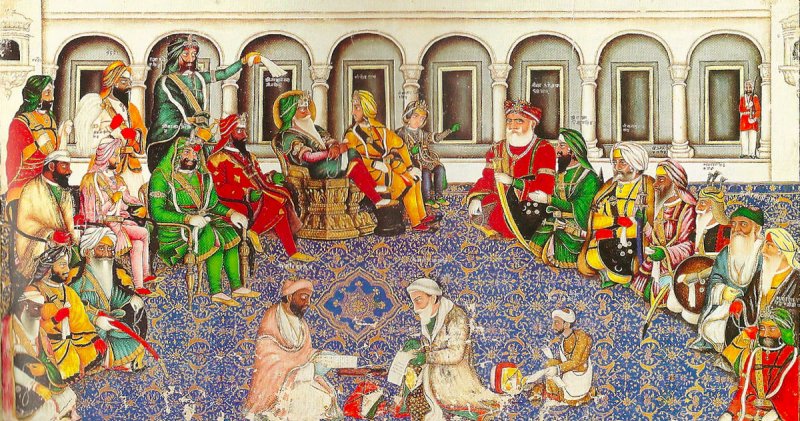Sikhism is one of the four Dharmic religions of India along with Hinduism, Buddhism and Jainism. It focuses on the harmonious balance of spirituality and materialism.
This concept is also known as Rajarshi in Hindu philosophy with Rajarshi meaning a 'royal saint', similar to the philosopher-king of Plato.
As per Guru Nanak , anyone who makes a honest and virtuous living in remembrance of Waheguru (God), and shares his wealth with his fellow beings as charity need not perform any other rituals or austerities.
This fact was highlighted when the sixth of ten Gurus of the Sikh religion, Guru Hargobind met the Hindu saint Samarth Ramdas.
When Ramdas questioned Guru Hargobind on his fine horse and elegant attire and asked what kind of saint was he, Guru Hargobind replied thus, "Internally a hermit, and externally a prince. Arms mean protection to the poor and destruction of the tyrant. Baba Nanak had not renounced the world but had renounced Maya".
Hinduism too considers the virtuous and saintly householder superior to the monk. The sage Tiruvalluvar commended that the monks too depend on their sustenance on the saintly householder who provides them with the necessities of food, medicine and shelter. Thus a part of the spiritual merit acquired by the monks is gained by the householder who supports them.
The king who rules his kingdom well and ensures the spiritual and material prosperity of his subjects, is said to gain more merit than a number of hermits.
Where-ever there is a Sikh Gurudwara anywhere in the world, you can also find a Langar or community kitchen where food is prepared and given freely to those in need. This is a major feature of its charity work.
In Syria, a Langar was set up by Sikh aid groups to feed the numerous refugees and Yazidis, a persecuted minority .

 www.thenewsminute.com
www.thenewsminute.com

 www.indiatoday.in
www.indiatoday.in
This concept is also known as Rajarshi in Hindu philosophy with Rajarshi meaning a 'royal saint', similar to the philosopher-king of Plato.
As per Guru Nanak , anyone who makes a honest and virtuous living in remembrance of Waheguru (God), and shares his wealth with his fellow beings as charity need not perform any other rituals or austerities.
This fact was highlighted when the sixth of ten Gurus of the Sikh religion, Guru Hargobind met the Hindu saint Samarth Ramdas.
When Ramdas questioned Guru Hargobind on his fine horse and elegant attire and asked what kind of saint was he, Guru Hargobind replied thus, "Internally a hermit, and externally a prince. Arms mean protection to the poor and destruction of the tyrant. Baba Nanak had not renounced the world but had renounced Maya".
Hinduism too considers the virtuous and saintly householder superior to the monk. The sage Tiruvalluvar commended that the monks too depend on their sustenance on the saintly householder who provides them with the necessities of food, medicine and shelter. Thus a part of the spiritual merit acquired by the monks is gained by the householder who supports them.
The king who rules his kingdom well and ensures the spiritual and material prosperity of his subjects, is said to gain more merit than a number of hermits.
Where-ever there is a Sikh Gurudwara anywhere in the world, you can also find a Langar or community kitchen where food is prepared and given freely to those in need. This is a major feature of its charity work.
In Syria, a Langar was set up by Sikh aid groups to feed the numerous refugees and Yazidis, a persecuted minority .

Syrian Langar: How a group of Sikh volunteers are helping provide food to refugees everyday
The Sikh community has long used the tranditional concept of langar to not only serve food to visitors in gurdwaras, but have also extended their service outsid

True to the teachings of Sikh Gurus, Langar Aid bring smiles in war torn areas
This effort taken by Khalsa Aid speaks volumes about their belief in helping and bringing smile on the faces of the needy.
Last edited:




